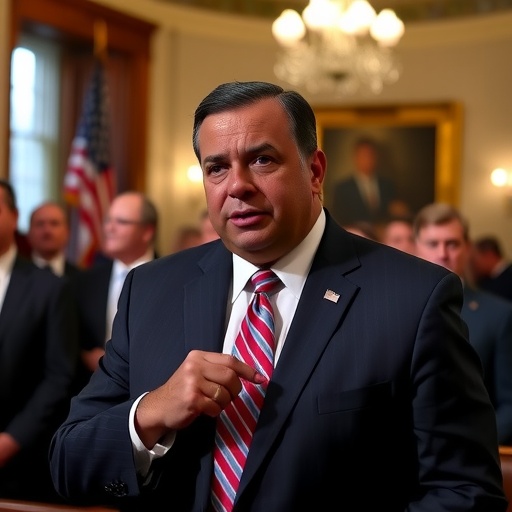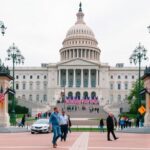US House Cancels Votes as Government Shutdown Stretches Into Uncertainty: Mike Johnson Faces Mounting Pressure
In a stunning move that underscores the deepening legislative gridlock in Congress, the House of Representatives has officially canceled all House votes scheduled for next Tuesday, with no immediate plans for lawmakers to reconvene in Washington. This decision comes as the ongoing government shutdown enters its precarious second week, leaving federal operations in limbo and intensifying partisan tensions under House Speaker Mike Johnson‘s leadership. The announcement, delivered late Friday, signals a rare admission of defeat in the face of stalled negotiations, raising alarms about the potential for an even longer impasse.
- Speaker Johnson’s Bold Call: Halting House votes Amid Shutdown Stalemate
- Senate’s Seventh Failed Vote: Democrats and Republicans Dig In Deeper
- Federal Workers Feel the Squeeze: Personal Stories Emerge from Shutdown Frontlines
- Roots of the Crisis: How Border Security and Spending Wars Fueled Gridlock
- Path Forward: Bipartisan Talks or Prolonged Paralysis?
The shutdown, triggered by disagreements over federal funding and border security measures, has already furloughed thousands of government employees and halted non-essential services. With the Senate also adjourning for the weekend following a seventh consecutive failed vote on a stopgap funding bill, the political theater in the nation’s capital has reached a fever pitch. Lawmakers from both sides of the aisle are pointing fingers, but the cancellation of House votes marks a pivotal shift, potentially delaying critical legislation on everything from disaster aid to national security.
As the clock ticks toward what could be the longest shutdown in recent history, the implications ripple far beyond the Beltway. Federal workers are bracing for missed paychecks, national parks remain shuttered, and economic forecasters warn of billions in lost productivity. This article delves into the key developments, the players involved, and the broader fallout from this escalating crisis in Congress.
Speaker Johnson’s Bold Call: Halting House votes Amid Shutdown Stalemate
House Speaker Mike Johnson, a Louisiana Republican navigating his first major crisis since assuming the gavel in October, made the unprecedented decision to scrap next week’s agenda. In a statement released through the House Clerk’s office, Johnson’s team cited “productive discussions” as the rationale, but insiders reveal a more desperate reality: without a resolution to the government shutdown, there’s simply no business to conduct.
“The focus right now must be on ending this shutdown, not on procedural votes that won’t move the needle,” a senior GOP aide told reporters off the record. Johnson’s move comes after weeks of intense wrangling, where House Republicans pushed for stringent border security provisions in any funding package—a demand that Democrats have repeatedly rejected as non-negotiable poison pills.
The cancellation affects more than a dozen bills queued for consideration, including measures on veterans’ affairs and agricultural support. According to the House Legislative Calendar, these House votes were set to address pressing issues like farm subsidies amid rising commodity prices. Now, with lawmakers dispersing to their districts, the chamber’s productivity has ground to a halt, exacerbating the legislative gridlock that has plagued the 118th Congress.
Johnson’s leadership has been under scrutiny since his narrow election, and this shutdown has amplified calls for change within his party. “Mike is doing the best with a fractured caucus,” defended Rep. Tom Emmer (R-Minn.), the House Majority Whip, in a Fox News interview. “But the Senate needs to step up— we’ve passed our bills; it’s time for them to act.”
Historically, such cancellations are rare and often signal deeper dysfunction. The last comparable instance occurred during the 2018-2019 shutdown under then-Speaker Paul Ryan, which lasted 35 days and cost the economy an estimated $11 billion. Analysts fear this episode could surpass that mark if cooler heads don’t prevail soon.
Senate’s Seventh Failed Vote: Democrats and Republicans Dig In Deeper
Across the Capitol, the Senate’s abrupt departure for the weekend capped a day of high drama, as Majority Leader Chuck Schumer (D-N.Y.) called for yet another vote on a clean funding bill. The measure, which would extend government operations through March without additional riders, failed for the seventh time, garnering only 48 votes in a chamber where 60 are needed to overcome a filibuster.
Republicans, led by Minority Leader Mitch McConnell (R-Ky.), blocked the bill, insisting on concessions related to immigration and spending cuts. “We’re not going to reward fiscal irresponsibility,” McConnell declared from the Senate floor, echoing demands from hardline conservatives in the House. The vote breakdown revealed stark partisan lines: all Democrats supported the measure, while only two Republicans—Sens. Susan Collins (Maine) and Lisa Murkowski (Alaska)—joined them, highlighting the entrenched legislative gridlock.
This isn’t the first time the upper chamber has stumbled on shutdown resolutions. In the past decade, Congress has flirted with shutdowns five times, each driven by similar battles over spending priorities. The current impasse stems from a December 2023 continuing resolution that expired on January 19, 2024, leaving agencies like the Department of Homeland Security and the IRS operating on borrowed time.
Schumer didn’t mince words post-vote: “The American people deserve better than this manufactured crisis. Republicans are holding the government hostage over extreme demands.” His counterpart, McConnell, countered by blaming Democrats for not addressing what he called a “border invasion,” referencing record migrant encounters at the southern border—over 2.4 million in fiscal year 2023, per Customs and Border Protection data.
As senators pack their bags, procedural maneuvers loom large. A potential “vote-a-rama” on amendments could extend into next week, but with the House sidelined, any Senate action risks becoming moot. This synchronized exodus from Washington leaves the government shutdown without adult supervision, as one Capitol Hill veteran quipped to Politico.
Federal Workers Feel the Squeeze: Personal Stories Emerge from Shutdown Frontlines
While politicians debate in air-conditioned offices, the human cost of the government shutdown is hitting hardest among the 2.1 million federal civilian employees and countless contractors. Furloughs have already idled over 800,000 workers, with more facing unpaid leave as agencies prioritize essential services like air traffic control and law enforcement.
Take Sarah Jenkins, a 42-year-old Smithsonian curator in Washington, D.C., who shared her plight on social media. “My family relies on my paycheck for rent and groceries. This shutdown isn’t politics—it’s our livelihood,” Jenkins posted on X (formerly Twitter), her message garnering thousands of retweets. Stories like hers are multiplying, with the National Treasury Employees Union reporting a surge in calls to its hotline—up 300% from last month.
Economically, the toll is mounting. The Congressional Budget Office estimates that each week of shutdown costs the U.S. economy about $1.5 billion in lost output, including reduced consumer spending and delayed government contracts. Small businesses near federal installations, such as those in Arlington, Virginia, are seeing foot traffic plummet by 20-30%, according to local chamber of commerce surveys.
National parks, a shutdown staple for closures, have turned away over 100,000 visitors since January 20, per Interior Department figures. Iconic sites like Yosemite and the Grand Canyon are ghost towns, with rangers working without pay to maintain basic safety. “We’re passionate about our jobs, but this uncertainty is soul-crushing,” said one anonymous park ranger in a CNN interview.
Beyond workers, the shutdown disrupts vital programs. Head Start, serving low-income children, has laid off 20,000 staff nationwide, affecting 100,000 kids. Veterans’ benefits processing has slowed, with the VA backlog jumping 15% in the first week alone. These ripple effects underscore how Congress‘s legislative gridlock translates into real-world hardship, fueling public outrage that could sway midterm dynamics.
Advocacy groups are mobilizing. The Partnership for Public Service launched a “Pay Our Federal Family” campaign, collecting over 50,000 signatures urging lawmakers to end the shutdown. Meanwhile, backpay is guaranteed under law, but as one economist noted, “It’s cold comfort when bills pile up today.”
Roots of the Crisis: How Border Security and Spending Wars Fueled Gridlock
The current government shutdown didn’t erupt overnight; it’s the culmination of simmering tensions over fiscal policy and immigration that have defined the Biden era. At its core, the dispute revolves around a $1.6 trillion omnibus spending package, with Republicans demanding $20 billion in border wall funding and stricter asylum rules—echoing President Trump’s 2019 shutdown playbook.
House Speaker Mike Johnson has been a vocal proponent of these measures, tying them to what he describes as a “national security emergency.” In a December op-ed for The Wall Street Journal, Johnson wrote, “Securing our borders isn’t optional; it’s essential. Democrats’ refusal to negotiate is endangering lives and resources.” His stance aligns with the House Freedom Caucus, a bloc of 45 conservative Republicans whose votes he needs to maintain control.
Democrats, however, view these demands as leverage for unrelated policy goals. House Minority Leader Hakeem Jeffries (D-N.Y.) accused Republicans of “playing politics with people’s lives” in a press conference, pointing to the chamber’s passage of a partisan funding bill in September that included the contentious provisions. That bill, HR 4821, passed the House 217-215 but stalled in the Senate, setting the stage for today’s deadlock.
Broader context reveals a polarized Congress struggling with basic functions. The 118th session has seen only 27 laws enacted so far—fewer than at this point in the previous Congress—per GovTrack.us data. Factors include slim majorities (Republicans hold 221-212 in the House), internal GOP infighting post-McCarthy ouster, and Senate filibuster rules that amplify minority power.
Historical parallels abound. The 1995-1996 shutdowns under Clinton cost Newt Gingrich’s Republicans politically, while the 2013 standoff over Obamacare damaged both parties’ approval ratings. Polling from Gallup shows current congressional approval at a dismal 18%, with 62% blaming Republicans for the shutdown per a recent Quinnipiac survey.
External pressures add fuel: Inflation at 3.1% (December CPI) makes spending fights more acrimonious, and upcoming 2024 elections loom large. As one Hill strategist noted anonymously, “This isn’t just about funding; it’s a preview of the election-year battles ahead.”
Path Forward: Bipartisan Talks or Prolonged Paralysis?
As Congress members enjoy a forced recess, the question on everyone’s mind is: When—and how—will this end? Optimists point to informal talks between Johnson and Schumer, with a potential framework emerging around a short-term funding extension paired with border policy tweaks. “We’re closer than it seems,” hinted Sen. Kyrsten Sinema (I-Ariz.), a key swing vote, in an MSNBC appearance.
Yet pessimism prevails. The White House has ramped up pressure, with President Biden warning in a statement that “this shutdown is hurting real Americans, and Republicans will own the consequences.” Vice President Kamala Harris is scheduled to meet with moderate senators next week, aiming to broker a deal that could bring lawmakers back swiftly.
If no agreement materializes, the shutdown could extend into February, triggering more severe measures like delayed tax refunds and suspended FDA inspections. Economic models from Moody’s Analytics project a 0.2% GDP hit per week, potentially shaving 0.5% off annual growth if prolonged.
Looking ahead, this crisis may force structural changes. Bipartisan calls for budget process reform—such as automatic continuing resolutions to avert shutdowns—are gaining traction, with groups like No Labels pushing a “People’s Budget” initiative. For Johnson, the stakes are personal: Failure to resolve this could erode his speakership, much like Kevin McCarthy’s fate.
In the end, resolving the government shutdown will require compromise in a town allergic to it. As federal workers hold their breath and the economy teeters, the nation watches to see if Congress can break the legislative gridlock before irreparable damage sets in. Updates will follow as negotiations unfold.








